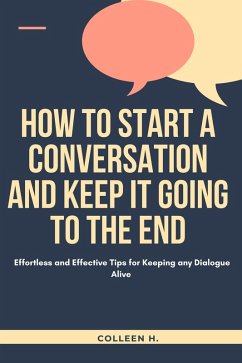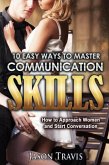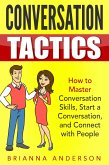Imagine you're at a party. The music's pumping, people are mingling, and you're standing there with a drink in hand, scanning the room. You notice someone you'd love to talk to, but something holds you back. That familiar hesitation creeps in"What do I say? How do I start? What if the conversation fizzles out and I look awkward?" You're not alone. We've all been there, and that fear of starting a conversation can feel paralyzing. But here's the thing: once you understand how to break that barrier, talking to anyone becomes a skill as natural as breathing.
Conversations are the lifeblood of human connection. Whether you're sitting in a job interview, chatting at a café, or networking at an event, your ability to start and sustain a conversation can open doors you never thought possible. Some people make it look easy, right? They walk into a room, and within minutes, they've got everyone laughing, nodding, and engaged in deep conversation. It's like a superpower, but the truth is, this ability isn't something only a select few are born with. It's something anyone can learn. It just takes practice, awareness, and a few solid strategies.
It all begins with that initial moment. You lock eyes, or maybe they're just nearby, and you feel that tuga curiosity, an interest, a desire to connect. Your mind starts racing through possible ways to kick things off, yet the fear of rejection lingers. What if they're not interested? What if they think you're boring? That's where most people get stuck. They let those thoughts build a wall, preventing them from taking the first step. But here's the secret: people want to connect. They want to talk, to be heard, to share stories. And more often than not, they're waiting for someone to make that first move.
You might think you need some grand, witty line to break the ice, but in reality, the best conversations start simply. A comment about the environment, a shared observation, a question about the person's experience at the eventyou'd be amazed how quickly things can flow once that first word is spoken. Think of conversation as a dance. You don't start with a grand finale; you begin with small steps, finding your rhythm together.
Let's get something straight: confidence is not some mystical quality reserved for the ultra-charismatic. It's built step by step. The first time you approach someone, it might feel awkward. You might stumble over your words or second-guess yourself. That's normal. But each time you take that leap, each conversation you initiate, that confidence grows. It builds from within, and soon, you won't be the one standing on the sidelines anymore. You'll be in the center, leading conversations, making connections, and feeling like you belong in every room you step into.
Now, let's talk about keeping that conversation going once it starts. It's one thing to break the ice, but what about the moments that follow? You've said hello, they've responded, and now the ball's rolling. This is where many people freeze. They get stuck in surface-level small talk, repeating the same tired questions, and before long, the conversation dies. What separates a great conversationalist from the average one is their ability to dig deeper, to move past the mundane and into territory that feels real and engaging.
Here's the trick: curiosity. If you approach every conversation as an opportunity to learn something new, you'll never run out of things to talk about. People love talking about themselveswhat they're passionate about, what drives them, what makes them unique. When you show genuine interest in someone else's story, the conversation flows naturally.
Conversations are the lifeblood of human connection. Whether you're sitting in a job interview, chatting at a café, or networking at an event, your ability to start and sustain a conversation can open doors you never thought possible. Some people make it look easy, right? They walk into a room, and within minutes, they've got everyone laughing, nodding, and engaged in deep conversation. It's like a superpower, but the truth is, this ability isn't something only a select few are born with. It's something anyone can learn. It just takes practice, awareness, and a few solid strategies.
It all begins with that initial moment. You lock eyes, or maybe they're just nearby, and you feel that tuga curiosity, an interest, a desire to connect. Your mind starts racing through possible ways to kick things off, yet the fear of rejection lingers. What if they're not interested? What if they think you're boring? That's where most people get stuck. They let those thoughts build a wall, preventing them from taking the first step. But here's the secret: people want to connect. They want to talk, to be heard, to share stories. And more often than not, they're waiting for someone to make that first move.
You might think you need some grand, witty line to break the ice, but in reality, the best conversations start simply. A comment about the environment, a shared observation, a question about the person's experience at the eventyou'd be amazed how quickly things can flow once that first word is spoken. Think of conversation as a dance. You don't start with a grand finale; you begin with small steps, finding your rhythm together.
Let's get something straight: confidence is not some mystical quality reserved for the ultra-charismatic. It's built step by step. The first time you approach someone, it might feel awkward. You might stumble over your words or second-guess yourself. That's normal. But each time you take that leap, each conversation you initiate, that confidence grows. It builds from within, and soon, you won't be the one standing on the sidelines anymore. You'll be in the center, leading conversations, making connections, and feeling like you belong in every room you step into.
Now, let's talk about keeping that conversation going once it starts. It's one thing to break the ice, but what about the moments that follow? You've said hello, they've responded, and now the ball's rolling. This is where many people freeze. They get stuck in surface-level small talk, repeating the same tired questions, and before long, the conversation dies. What separates a great conversationalist from the average one is their ability to dig deeper, to move past the mundane and into territory that feels real and engaging.
Here's the trick: curiosity. If you approach every conversation as an opportunity to learn something new, you'll never run out of things to talk about. People love talking about themselveswhat they're passionate about, what drives them, what makes them unique. When you show genuine interest in someone else's story, the conversation flows naturally.
Dieser Download kann aus rechtlichen Gründen nur mit Rechnungsadresse in A, B, CY, CZ, D, DK, EW, E, FIN, F, GR, H, IRL, I, LT, L, LR, M, NL, PL, P, R, S, SLO, SK ausgeliefert werden.









